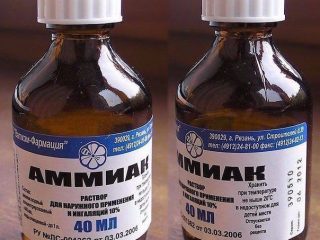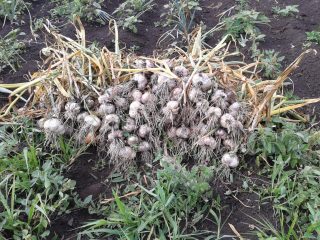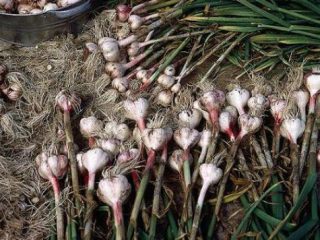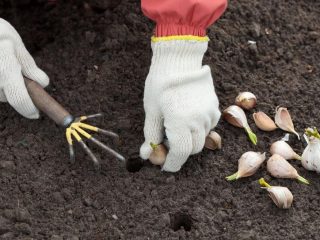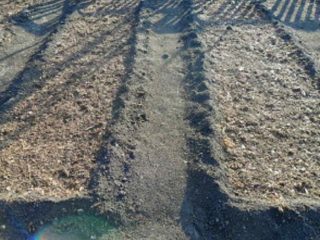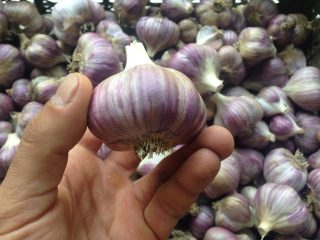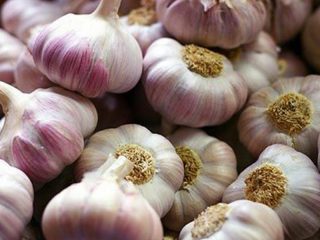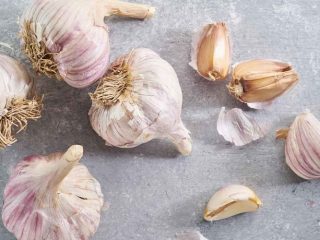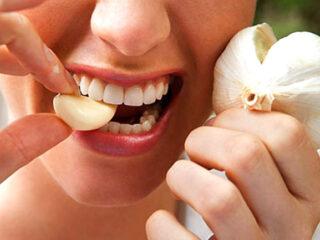Content
Garlic arrows against aphids have a good effect when used as a household insecticide. Infusions and decoctions based on the spicy vegetable repel pests from the garden, and if the plantings are already infected, they have a suppressive effect on parasites.
Are aphids afraid of garlic?
Garlic contains a large number of active esters with a pungent odor and phytoncides that have antimicrobial properties. These substances repel insects that feed on the green mass of plants and help expel aphids, one of the most dangerous pests, from the garden.
Garlic is often used in its pure form as an insecticide. But it is also allowed to be mixed with other components to enhance its valuable properties.
Aphids appeared on garlic, what to treat with?
Aphids themselves attack garlic quite rarely, since even in garden beds the plant emits an aroma that is unpleasant to the pest. But if the insect does appear on the leaves, you can deal with it using a soap-ash infusion. The remedy is made like this:
- About 300 g of sifted wood ash is poured into 10 liters of warm water.
- Stir the powder until smooth and place the bucket on the fire.
- After the solution boils, continue to simmer it for about half an hour at low heat.
- When ready, add 125 g of grated laundry soap and mix again.
The cooled product is used to spray garlic. You need to spray the composition every 2-3 days until the aphids are eliminated.
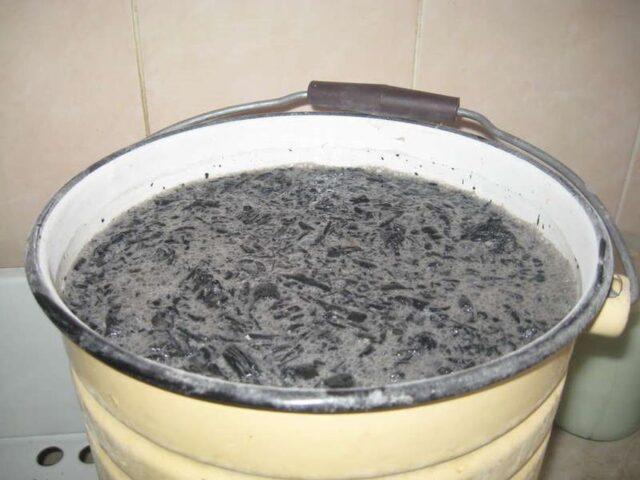
For preventive purposes, garlic is sprayed with a soap-ash solution every two weeks.
What plants does it protect?
Garlic decoctions and infusions are universal and suitable for almost any plant. With their help, you can treat both garden and garden crops against aphids.
Fruit trees
Aphids often attack apple, pear, peach and other fruit trees in the orchard. Garlic infusion can be used both for watering plants and for spraying. Active essential oils in home remedies repel pests and provide protection for 1-2 weeks.
It is recommended to spray fruit crops during budding or immediately after flowering. You can also apply a canopy treatment about three weeks before harvest. Garlic does not harm ripening fruits and does not affect their quality.
cucumbers
Cucumbers in open ground and in greenhouses are especially often affected by aphids.Pest attacks can significantly reduce crop yields. It is recommended to spray cucumbers with garlic infusion from late spring until harvest. The last time the treatment is carried out is approximately three weeks before the fruit is harvested.
It is especially important to pay attention to spraying cucumbers in greenhouses. In conditions of high temperature and high humidity, aphids spread very quickly throughout the plantings.
Tomatoes
There are several ways to use garlic to protect tomatoes from aphids. First of all, standard spraying is used - the leaves and fruits are irrigated with an insecticidal infusion in the morning or evening hours. If the treatment is carried out in a greenhouse, then immediately after it the greenhouse must be properly ventilated.
To protect against aphids, garlic can be planted between rows in beds with tomatoes. During the development process, the plant releases phytoncides into the environment and soil and serves as a good pest prevention.
Cabbage
You can prepare an infusion of garlic against aphids when cabbage is infested. It is recommended to spray leaves and ripening heads of cabbage at the first sign of insects. You can also use garlic to prevent aphids by planting it next to cabbage beds or irrigating it before symptoms appear.
bell pepper
Sweet bell peppers have a certain attractiveness to pests and are often attacked by aphids. Garlic is used to treat the crop in the traditional way - the bushes are sprayed along the crown on a cloudy and dry day. When carrying out treatment, they try to control that the insecticidal infusion gets onto the underside of the leaf blades.
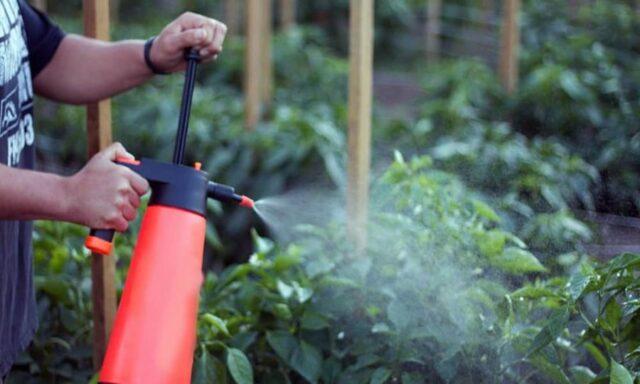
To prevent bell peppers from starting to taste bitter, stop spraying three weeks before harvest.
Raspberries
Aphids can quickly destroy raspberry bushes, because with a massive attack they eat the leaves in a matter of days. To protect the plantings from the pest, it is necessary to hang garlic arrows directly on the branches. You can also place the spicy vegetable between the bushes - it will prevent the appearance of aphids.
Insecticidal spraying of garlic is carried out from spring until the harvest begins to ripen. It is better not to irrigate ripe berries with a homemade preparation so that they do not change their taste characteristics.
Currant
When infested by aphids, currant leaves become deformed, become reddish, have swellings and a sticky shiny film on them. Affected plants form berries poorly and generally lag behind in development.
To prevent and eliminate aphids, it is recommended to spray currant shoots with garlic infusion every year from mid-spring. In autumn, the product is used to water the beds - this helps to destroy insects in the soil.
Kalina
In the summer, viburnum often suffers from invasion of aphids and other parasites. It is recommended to spray the plant with garlic starting in May at intervals of 10-14 days.
The pungent odor of the infusion can repel not only pests, but also beneficial insects. Therefore, it is recommended to stop spraying during active flowering.
Rose
Not only vegetables and fruit trees, but also ornamental crops suffer from aphid infestations. The pest causes great damage to roses - it worsens the appearance of leaves and stems, reduces the abundance of flowering and deforms the buds.
Garlic is well suited for eliminating and preventing aphids in the flowerbed. The active substances in its composition repel the pest and prevent its spread throughout the rose bushes.Plants are treated when the first symptoms of the presence of the parasite appear, or the crop is sprayed prophylactically.
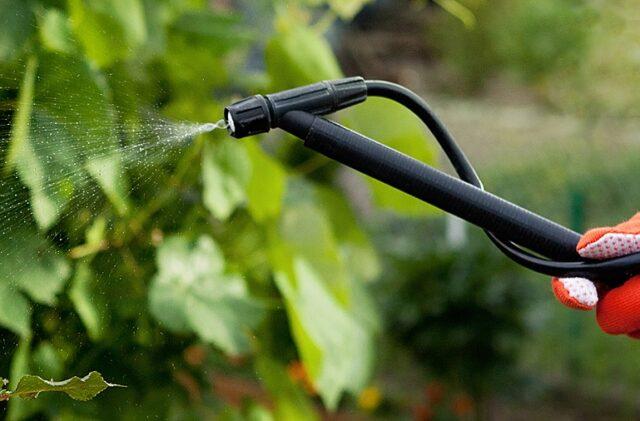
You can spray roses with garlic, including during flowering, but so that the bulk of the infusion falls on the leaves
Dill
Dill itself contains a large amount of phytoncides and rarely suffers from sucking pests. But if aphids do appear on the stems and leaves, it is necessary to use a garlic solution to eliminate the parasite.
Spraying is carried out until the formation of inflorescences of the crop. You can also water the soil at the roots of the plant with decoctions and infusions. This will help eliminate pest eggs in the soil and prevent a second wave of parasite invasion.
Houseplants
Garlic can also be used for spraying indoor plants. But the treatments are carried out with caution - the solutions must have a weak concentration. If the garlic infusion is too strong, it can burn the roots of ornamental crops located close to the surface of the soil in the pot.
It is necessary to spray indoor flowers against aphids before and after the buds open. It is also allowed to water the soil in pots with garlic water with a low content of the active ingredient.
How to get rid of aphids using garlic
Garlic infusion for spraying against aphids can be prepared using several algorithms. Sometimes the product is used in its pure form, and in some cases auxiliary active ingredients are added.
In its purest form
You can use garlic to eliminate aphids not only in the form of a decoction or infusion.If the plants in the garden are not too badly affected by the pest, you can simply grind a few cloves into a paste and spread them under the bushes.
The pungent odor esters released by garlic will have a repellent effect on parasites. In order for the effect to remain constant, as the gruel dries, it must be replaced with fresh one.
Solution
You can make a garlic solution for aphids using a simple recipe. The diagram looks like this:
- About 10-12 cloves of garlic are peeled.
- Fill with cool water so that it completely covers the raw materials.
- Cover the container with a lid and leave in a warm place for three days.
The prepared solution is used for spraying plantings.
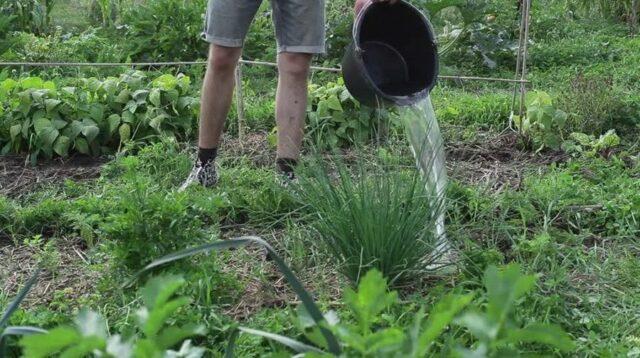
The concentration of a simple garlic solution is weak, so it can be used for watering at the root
Soap solution
An infusion of garlic against aphids and ants with the addition of laundry soap has a good insecticidal effect. Prepare the drug as follows:
- Garlic cloves or green arrows are peeled and crushed in a volume of 500 g.
- Pour 2 liters of warm water into the raw material.
- The product is put away under the lid for a day in a dark, warm place.
- After the period has passed, add 50 g of crushed laundry soap to the solution.
- Stir properly.
The finished product is filtered to remove garlic residues and the plantings are generously sprayed. The laundry soap in the composition not only enhances the insecticidal effect, but also prevents the preparation from being quickly washed off from the leaves by precipitation.
Garlic infusion for spraying plants against aphids
An infusion of crushed garlic cloves has a strong insecticidal effect. It is done using this algorithm:
- Grind peeled garlic or arrows to a pulp in the volume of a glass.
- Pour 10 liters of hot water into the raw material.
- For a day, remove the product under the lid in a dark place.
- After time, filter the sediment.
The resulting product is sprayed onto the vegetative mass of vegetable and garden crops. You must first make sure that the garlic solution for combating aphids emits a distinct, pungent odor, otherwise it will be of little use.
Garlic tincture against aphids
Garlic tincture against aphids is prepared using water, but at the same time provides the product with an increased concentration. The recipe looks like this:
- Garlic cloves or arrows are peeled and passed through a meat grinder in an amount of 1 kg.
- Combine the pulp with 1 liter of water.
- Keep in a dark place for ten days.
- After the expiration date, filter the garlic tincture against aphids and squeeze out the sediment.
Due to the high concentration of the product, it is not used for spraying in its pure form. It is necessary to combine 50 ml of tincture with 10 liters of lukewarm water and only then irrigate the plantings.
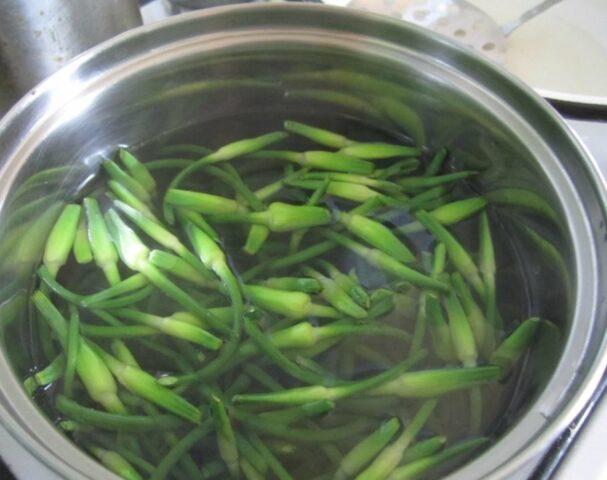
It is recommended to use garlic tincture in case of severe aphid infestation of plants.
Treating plants with garlic against aphids
When using garlic products against aphids, you must adhere to some important rules:
- use any drug within three days from the moment of final preparation;
- spray the plants not only in the upper part, but also on the lower sides of the plates;
- carry out treatments in dry and warm, but sunny weather to avoid burns on the leaves;
- choose windless days for spraying.
It is recommended to treat aphids with garlic water not only on the affected plants themselves, but also on the anthills on the site. Insects most often exist in the garden in close symbiosis.If you eliminate the aphids but leave the ants, the parasite will soon appear on the plantings again.
How often can I use it?
It is necessary to spray plants with garlic on a regular basis. If the bushes are already affected by aphids, then the treatment is carried out every 2-3 days or every other day until the pests completely disappear. Preventive spraying is carried out once every three weeks from mid-spring to late autumn.
What pests does it help with?
Garlic decoctions for plants against aphids are also beneficial when infested with other pests. In particular, drugs can be used against the following insects:
- cabbage whites;
- sawfly;
- snails and slugs;
- thrips;
- beetles and caterpillars.
Spraying is carried out in accordance with the life cycles of a particular parasite.
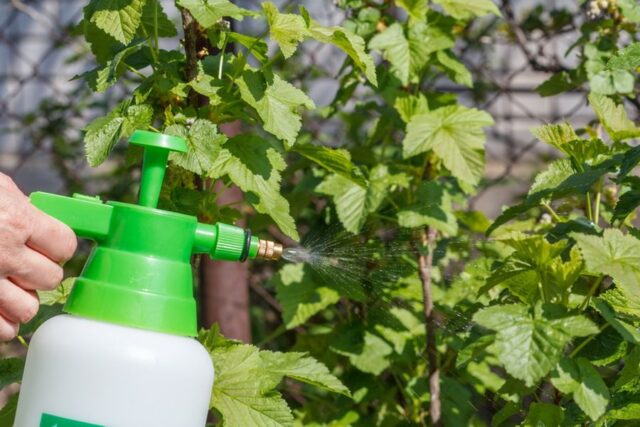
Usually in the garden it is recommended to perform at least 3-4 treatments with garlic infusion per season
Pros and cons of using
Garlic as an insecticidal agent has its pros and cons. The advantages of decoctions and solutions include:
- accessibility and ease of preparation;
- safety for plants, humans and soil microorganisms;
- good efficiency.
However, garlic as an insecticide has some disadvantages. In particular:
- the pungent odor of the infusion can be unpleasant for many people, and sometimes even provokes allergies;
- in high concentrations, solutions can burn the roots and leaves of crops and slow down their growth;
- Garlic repels not only pests, but also valuable insects.
When using natural insecticidal infusions, treatments must be repeated regularly. With a single use, garlic will bring a certain result, but will not provide long-term preventive protection.
Conclusion
Garlic arrows against aphids help eliminate the pest in the garden or prevent its appearance. Infusions based on spicy vegetables are highly safe, but require repeated use.
